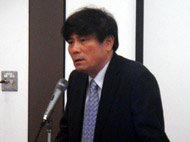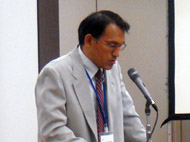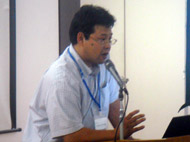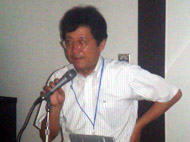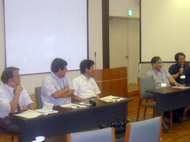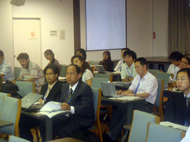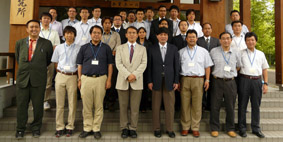Events
Disaster Management for Human Security in Asian Megacities
Date: August 25, 2009
Venue: Wood Hall, Uji Campus, Kyoto University, Japan
Organized by:
Kyoto University Global COE Program "Global Center for Education and Research on Human Security Engineering for Asian Megacities"
Co-organized by:
Disaster Prevention Research Institute
Number of attendants: 80 - 100
Poster
Program
Report 048
Outline
The GCOE-HSE Special Symposium on "Disaster Management for Human Security in Asian Megacities" took place at Wood Hall in the Kyoto University Uji Campus on 25 August 2005 with more than 80 participants. The purpose of this symposium is to identify the role of DRM group in educating international students and in promoting disaster mitigation research through mutual discussion on target topics. In this symposium, "Disaster Risk Management" was selected as the primary topic for four principal research fields: "Urban Governance," "Urban Infrastructure Management," "Health Risk Management," and "Disaster Risk Management." Young GCOE-HSE researchers, including doctoral students, gathered at the meeting in order to promote debate concerning basic human needs, environmental degradation, and disaster mitigation strategies for Asian megacities.
Report
At the symposium, Prof. Norio Okada, Director of DPRI, introduced current and future visions of DPRI; the GCOE program coordinator, Prof. Minoru Yoneda, introduced the GCOE program; and the leader of research field "Disaster Risk Management", Prof. Hirokazu Tatano, presented the concepts behind the GCOE-HSE program and the role of the DPRI focal point, emphasizing the need to provide engineering and scientific resources in order to decrease social vulnerability to natural disasters in the Asian region. Following the presentations, Prof. Tomoharu Hori introduced a system for the simulation of population evacuation in case of floods. Subsequently, young GCOE-HSE researchers and students reported their research achievements. Their presentations included the installation of seismic observation devices in eastern Asian countries, numerical simulation of glacial lake outburst floods in the Himalayas, and evaluation of water resources in the Asian region. After finishing all presentations, a panel discussion was held, marked by enthusiastic discussion among students, young researchers and professors. GCOE students addressed, in particular, such issues as difficulties in obtaining local data necessary for carrying out surveys applicable for the region, and difficulties in adapting scientific/engineering research to local needs.
All the students who attended the symposium greatly enjoyed the discussion and expressed their wish for holding symposium continuously in order to maintain mutual cooperation between program leaders and students.
